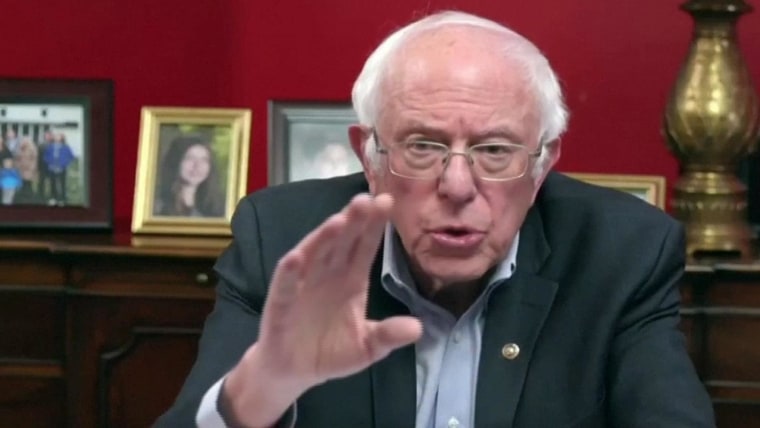WASHINGTON — Bernie Sanders is launching a wave of attacks on Joe Biden’s support for trade deals like NAFTA ahead of contests in industrial Midwestern states after the Super Tuesday resurgence powered the former vice president into a delegate lead.
A new Sanders TV ad features a union autoworker lamenting that his community “has been decimated by trade deals.” A second ad that began airing in Michigan late this week takes pointed aim at his rival: “Bernie Sanders has consistently fought job-killing trade deals. Joe Biden — he supported NAFTA and every other bad trade agreement. With a record like that, we can’t trust him to protect American jobs or defeat Donald Trump.”
On the trail, Sanders himself is making the same pitch. “Does anybody think that Joe can go to Michigan or Wisconsin or Indiana or Minnesota and say vote for me, I voted for those terrible trade agreements? I don’t think so,” Sanders told supporters Monday in St. Paul, Minnesota. His crowd booed.
Sanders repeatedly hit Biden on trade while speaking to reporters on Wednesday and on Friday before his trip to Michigan — a swing he expanded late, canceling a scheduled speech in Mississippi.
The focus on trade comes as Sanders hopes to regain his edge in a race that has narrowed to a one-on-one with Biden, who has rapidly consolidated Democratic elites with a flurry of endorsements from moderate former rivals. The issue of trade helped Sanders win Michigan, Wisconsin and Indiana in his unsuccessful 2016 campaign against Hillary Clinton, and those states have become indispensable if he wants to capture the nomination this time.
While Biden seldom focuses on trade policy at his rallies, Sanders aides see it as a potent issue for him in the primary and to counter Donald Trump’s message to working class voters in the Midwest during the general election.
Let our news meet your inbox. The news and stories that matters, delivered weekday mornings.
“We’re going to see trade come to the fore in a big way. Bernie’s record on trade is very, very strong and Biden’s is very, very suspect,” Sanders pollster Ben Tulchin told NBC News. “Those trade deals have devastated communities. Bernie has opposed those deals and has always stood up for working people and union members.”
The contrast illustrates some of what is at stake for Democratic voters. Biden was a reliable supporter of free trade pacts over his 36 years in the Senate and eight years as vice president, while Sanders has been a consistent opponent. Biden supports the NAFTA revisions struck by Trump as an improvement for workers, while Sanders rejects it and says it won’t stop the outsourcing of U.S. jobs.
It is one of many differences of opinion between the moderate former vice president and the self-described democratic socialist who’s seeking to rally voters around a “political revolution.”
Biden campaign spokesman Andrew Bates said the U.S. must continue to sell its products to consumers outside the country to create American jobs, arguing that industrial states “have spent years enduring the economic pain that Trump’s trade war has forced on them” and want a change in direction.
“Also, a President Biden would never sign any trade agreement for which labor and environmental advocates have not been at the negotiating table from Day One,” Bates told NBC News. “He would not move forward with any new agreements until we’ve made major investments in the middle class here at home.”
Biden rolled out an endorsement Thursday from Michigan Gov. Gretchen Whitmer, who defeated Sanders-backed challenger Abdul El-Sayed in the 2018 Democratic primary.
Brian Fallon, who was the national spokesman for the 2016 Clinton campaign, said the focus on trade helps Sanders, but warned that it wouldn’t be enough.
“In the best-case scenario, that may power Bernie to some wins in Michigan, Ohio and maybe Wisconsin — and that is what he got out of it when he did that in 2016, he beat Hillary in Michigan. But he didn’t net a lot of delegates in Michigan,” Fallon said. “The more urgent priority is how can he cut into Biden’s margins with black voters in the South. He could pull off wins in industrial Midwestern states, but they’re not going to net him a lot of delegates.”
“I get that as your strategy for trying to maximize your chance to win in the upper Midwest, but what are you going to do about the Mississippis and Georgias of the world?” he said.
In 2016, Sanders lost to Clinton by lopsided margins in Southern states with large shares of black voters. If Super Tuesday results are any indication, that could happen again with Biden. While Sanders has shown strength in states he lost last time, such as Nevada and California, he can ill-afford to backslide anywhere, especially after losing Minnesota on Tuesday.
Free trade has traditionally been a thorny issue with Democrats, but a recent Gallup poll suggests that the party has developed a more positive view of it under Trump, potentially as part of a backlash to his tariffs and protectionist policies.
Michael Starr Hopkins, a Democratic strategist who recently served as a spokesman for John Delaney’s 2020 campaign, said Biden can deflect the attack by pointing out Sanders’ support for replacing private insurance coverage with a government-run plan.
“The bigger thing that’s a tool for Biden is ‘Medicare for All.’ The fact that it eliminates private health care means that it’s something that people with union health care plans and benefits that they negotiated are really going to hate,” he said. “In the Midwest, especially in places like Michigan with the automotive manufacturers … I think it’s going to be a scary premise.”
Sahil Kapur and Carrie Dann reported from Washington; Gary Grumbach and Shaquille Brewster reported from Phoenix.
Gary Grumbach , Shaquille Brewster and Carrie Dann contributed.












